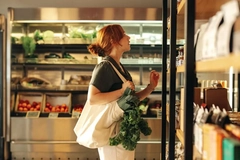“Take the toxins out of packaging”: Study identifies harmful PFAS in leading supermarket packaging

13 Dec 2018 --- Takeout food packaging from several leading US grocery stores is likely treated with harmful Per- and polyfluoroalkyl (PFAS) chemicals, a study by Safer Chemicals Healthy Families and Toxic-Free Future has found. The findings have prompted Whole Foods to remove all the packages cited in the report, as five of the 17 materials from the supermarket tested positive for the chemical.
PFAS are highly persistent and toxic chemicals whose widespread use has reportedly contaminated drinking water across the US. When used in food packaging, the chemicals can leach out of the packaging and get into the food, people, compost and the environment. Widely used in consumer products to repel grease, water, and stains, PFAS has also been detected in compost made from recycled paper products treated with PFAS. When the compost is spread on the land it can contaminate water bodies, soil, wildlife and crops.

The chemicals have long been associated with a variety of ill-health effects, such as pre-eclampsia, liver damage, increased risk of thyroid disease, decreased antibody response to vaccines and an increased risk of developing asthma, Erika Schreder, Science Director for Toxic-Free Future, tells PackagingInsights.
The study, Take Out Toxics: PFAS Chemicals in Food Packaging, found nearly two-thirds of paper takeout containers, such as those used at self-serve salad and hot bars, contained elevated levels of fluorine, indicating they were likely treated with PFAS. Eleven percent of bakery and deli papers tested were also likely treated with PFAS.
The findings come at a time when these chemicals are increasingly under scrutiny by government regulators. Washington state and San Francisco recently banned PFAS in paper food packaging. New York has required its state agencies to give preference to PFAS-free food packaging when making purchasing decisions.
“It’s time for our nation’s leading grocery stores to take the toxics out of their packaging,” says Mike Schade, Mind the Store campaign director for Safer Chemicals, Healthy Families.
“Consumers use these containers as a convenience to bring home food for their families. They don’t expect harmful chemicals to be part of their dinner. The good news is that PFAS-free takeout containers are also available, so grocery retailers can switch to safer packaging. Grocery chains must mind the store to safeguard our health,” he adds.
The findings were consistent with recent studies, such as in Denmark, that find continuous use of PFAS in paper food packaging but also the widespread adoption of alternatives, Schreder adds.
As well as Whole Foods removing the materials from its stores, Trader Joe's also issued a statement, reported by Bloomberg, saying “Trader Joe’s is asking its vendors to avoid the use of PFAS in packaging for our products. In addition, Trader Joe’s does not have food bars or delis, so takeout food containers are typically not found in our stores.”
“Takeout packaging without harmful chemicals is widely available, and grocery chains should make the safest choice for their customers,” says Schreder. “It doesn’t make sense to use chemicals that never break down in the environment to treat takeout packaging when safer options can be chosen.”
The study
Researchers tested 78 food packaging samples from five of the nation’s largest grocery stores: Ahold Delhaize (parent of Food Lion, Stop and Shop, and Hannaford), Albertsons, Kroger, Trader Joe’s, and Whole Foods Market (Amazon). Items tested included paper takeout containers, bakery or deli papers, microwavable trays, and baking supplies like muffin cups.
The results included:
- 13 percent (10 out of 78 samples) of all food packaging samples tested were likely treated with PFAS.
- 63 percent (5 out of 8) of takeout containers were likely treated with PFAS. Four out of the five analyzed takeout containers from Whole Foods Market were likely treated with PFAS.
- 11 percent (4 out of 38) of deli and bakery papers tested were likely treated with PFAS.
- Tests of packaging for cook-at-home food and home baking supplies, including microwave- and oven-cook food trays, butter wrappers, baking cups, and rolls of parchment paper did not find any items likely treated with PFAS.
- In many cases, retailers use or sell packaging that is free of PFAS treatment, indicating that PFAS-free alternatives are widely available and competitively priced.
In response to the report, Whole Foods Market said, “Whole Foods Market introduced compostable containers to reduce our environmental footprint, but given new concerns about the possible presence of PFAS, we have removed all prepared foods and bakery packaging highlighted in the report. We’re actively working with our suppliers to find and scale new compostable packaging options.”
Health advocates are urging grocery stores and food retailers to set goals and timelines for reducing and elimination PFAS in all its materials, as well as meet the new Washington state ban on PFAS use in food packaging, not just in Washington, but nationwide. They are also calling for all commercial composting facilities to ban all PFAS-treated materials immediately.
By Laxmi Haigh












